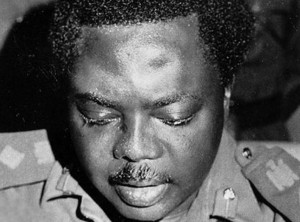
Murtala Muhammed; Head of the short-lived military government whose face adorn the twenty naira note. Muhammed became Nigerian Head of State on July 29, 1975 following the overthrow of General Yakubu Gowon, who had ruled the country for nine years. A civil war hero, Muhammed was assassinated on February 13, 1975 on his way to his office at Dodan Barracks, Lagos, in a bloody coup attempt led by Lt.- Colonel Bukar Sukar Dimka. He ruled the country for only 201 days during which the nation woke up from the lassitude of the preceding regime.
Born on November 8, 1938, in Kano, Lt-Col. Murtala Muhammed led many northern military officers, in a coup which started like a mutiny at midnight on July 28, 1966 and it resulted in the murder of Nigeria’s first military Head of State, General Aguiyi Ironsi[i].
Regime
In August 1975, General Murtala Muhammed inaugurated the eight man panel, which midwifed the birth of Abuja. The panel, headed by late Justice Akinola Aguda, recommended the relocation of the nation’s capital to a vast expanse of virgin territory in the heartland of the country[ii]. Within days after he became head of state, General Muhammad initiated a comprehensive review of the Third National Development Plan and reappraised Nigeria’s foreign policy, making Africa the centre piece of the country’s external relations. This was demonstrated with Nigeria’s position on Angola’s independence when the country backed the MPLA led Augustiho Neto. MPLA was supported by Soviets and Cuba, against Jonas Savimbi’s UNITA backed by the United States of America. The realignment in foreign relations strained Nigeria’s ties with the United States, which argued for the withdrawal of Cuban troops and Soviet advisers from Angola Muhammed deepened his non-aligned policy with the receipt in October 1975 by the Nigerian Air Force of Soviet-built aircraft that had been ordered under Gowon.
On the domestic political front, Muhammed had set October 1, 1979 as the target date for return of the country to democratic rule. His successor as Head of State, General Olusegun Obasanjo, hitherto Chief of Staff Supreme Headquarters, kept faith with the programme and handed over power to Alhaji Shehu Shagari on the set date[iii].
[i] Punch July 30, 2006
[ii] Tell May 2007
[iii] Westerner, March 2, 2009





















